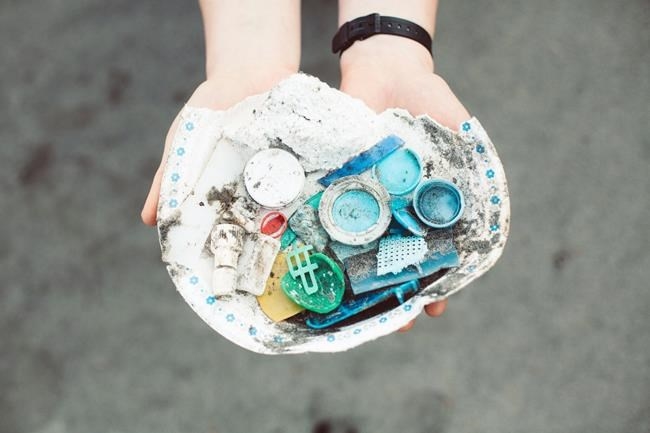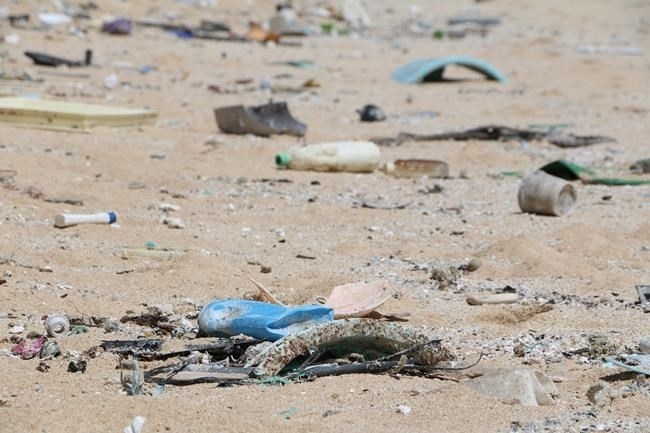
(DON THOMPSON / iNFOnews.ca)
July 01, 2019 - 12:00 PM
OPINION
Every 53 minutes a ship container somewhere on the world’s oceans slides overboard…more flotsam for oceans already drowning in garbage. That’s about 10,000 shipping containers a year…full of everything from golf bags and umbrellas to basketballs and beer coolers.
The sad truth is…those lost shipping containers are almost insignificant. You see, every year, we - people on earth - add eight million metric tons of plastic to the world’s seas. That’s just plastic, mind you, and doesn’t include a host of other materials and elements…some really nasty…like raw sewage.
The situation is so bad…the problem so overwhelming…that when I say the world’s largest landfill isn’t on land at all…perhaps you get a glimpse of just how bleak things have become.
If you got into a bathtub with the same proportions of crap - literally and figuratively - you’d surely hop out faster than you got in.
Forget partisan politics and pointing fingers at this nation or that industry…the facts surrounding the garbage in our oceans are as shameful and inexcusable as any facts on most any topic. If you aren’t sickened by what you’re reading here…well, you must have sold your soul to some devil…somewhere…some time.
I’ve always cared about the quality of our oceans…growing up in Florida surrounded on three sides by water...it seemed obvious. I’m not old, but I’ve lived long enough to see the waters lapping on Florida’s shores from the Atlantic Ocean and the Gulf of Mexico degrade substantially.

An assortment of debris found on the shoreline of Haida Gwaii, B.C., is shown in this undated handout photo. A study analyzing data from volunteer shoreline cleanups in British Columbia says cigarettes and filters from them account for almost 50 per cent of the waste collected in Vancouver and Victoria. University of British Columbia researchers say the findings could help guide future waste management strategies, especially when it comes to reducing plastic pollution.
Image Credit: THE CANADIAN PRESS/HO - University of British Columbia, Mo Phung
As a kid, a walk on Daytona Beach didn’t resemble the scavenger hunt that it does today. Today, nothing I find washed up on Florida’s beaches surprises me…nothing. Some places in Florida I used to swim freely…you’d now have to push me in.
Let’s talk a little science. There are a half-dozen gyres - somewhat circular ocean current patterns - around the world that pull garbage into vortexes…accumulations of everything that floats. One of the biggest of these gyres - with the unscientific sounding name of the Great Pacific Garbage Patch - lies between North America and Japan. It’s huge…and it’s getting bigger every day.
By the way, when I say float, don’t so much visualize stuff on the surface of the water. Plastics caught in the earth’s various gyres - much like icebergs - are mostly below the surface. In fact, the vast majority of floating plastics break apart and are 600 feet to 2,000 feet below the surface.
And while these swirling garbage dumps have been called “trash islands” by some…don’t look out the window on your next flight to Tokyo and expect to see some huge coagulation of garbage bobbing in the Pacific. Oh, were it that simple…clean up on aisle one would be relatively easy.
Instead, we have a sea of trillions of pieces of plastics floating…spread apart…and in clusters on and beneath the surface. It is as dimensional as a galaxy…a sea of most unglamorous and unromantic stars. And it’s not like you can drag a huge net and gather all the plastic. Besides, we would kill more fish and wildlife dragging the oceans with a net than we might save.
By the way, most of the plastics fouling our oceans come from us…on land…almost 80 percent. We litter plastics on beaches or near streams and rivers…and rains wash them into waterways…and they end up in our oceans.

In this May 5, 2016 image provided by the state of Hawaii, ocean debris accumulates in Kahuku, Hawaii on the North Shore of Oahu. Beyond simply piling up along the coast, discarded plastics that end up in the ocean could also be a major source of greenhouse gas emissions, according to a study by a Canadian-led team of researchers from the University of Hawaii.
Image Credit: THE CANADIAN PRESS/AP-Dan Dennison/Hawaii Department of Land and Natural Resources via AP
Far too many people are careless or indifferent toward using and throwing away plastic wraps and containers. Who hasn’t heard someone say after tossing some plastic, “I usually recycle but no big deal…it’s just that one bottle.”
You shouldn’t have to be a scientist to know…it’s a big deal…and one bottle times a few billion people is a problem. Public perception is, indeed, a problem.We all live locally…and it’s difficult to accept for many that what we do affects someone far away.
We should never forget that most plastics - unlike most trash - isn’t biodegradable. Microbes that break down other things…can’t touch polymers. So, the eight million metric tons we add this year joins the millions of tons we have dumped in previous years…a cumulative problem that never really goes away.
How much is eight million metric tons? Imagine if on every foot of ocean shoreline in Canada there was plastic stacked five feet high. Now, imagine another 191 countries around the world…and visualize the same five-foot-high stack of plastic on every foot of those nations’ shorelines. That’s eight million metric tons.
Yes, some plastics degrade because of sunlight…but most simply break into microscopic pieces. Those microscopic pieces then enter the food chain. The little crustaceans and oysters and clams that consume microscopic pieces of plastic are eaten by fish and animals that we eat. Again, you don’t have to be a scientist to understand that’s not a good thing.
We’ve all heard the terrible stories: fish caught and dying in old plastic fishing nets that have torn free and float aimlessly; sea turtles that eat plastic bags they mistake for jellyfish; millions of sea birds that pick up little plastic resin beads lost overboard in shipping containers and look amazingly like the little creatures they feed their young.
The bad news…there is not one reasonable plan for cleaning up the mess that already exists.
You could spend trillions of dollars trying to strain the ocean and barely make a dent in the problem. So, what do we do?
Well, one thing is get smart about the problem. Do your best to educate yourself and others that this is something your children and grandchildren will really suffer from. And what steps can we take while we hope against hope that some scientists will come up with a yet unknown technology to save us?
Recycle! Yeah, we’ve all heard that before. Old habits are hard to break, but recycling…being more attentive to using and disposing of plastics is the best thing we can all do. Yes, it does make a difference. Unless, of course, we decide that our grandchildren can deal with yet another problem we created for them. It’s up to us.
— Don Thompson, an American awaiting Canadian citizenship, lives in Vernon and in Florida. In a career that spans more than 40 years, Don has been a working journalist, a speechwriter and the CEO of an advertising and public relations firm. A passionate and compassionate man, he loves the written word as much as fine dinners with great wines. His essays are a blend of news reporting and opinion.
We welcome your comments and opinions on our stories but play nice. We won't censor or delete comments unless they contain off-topic statements or links, unnecessary vulgarity, false facts, spam or obviously fake profiles. If you have any concerns about what you see in comments, email the editor.
News from © iNFOnews, 2019